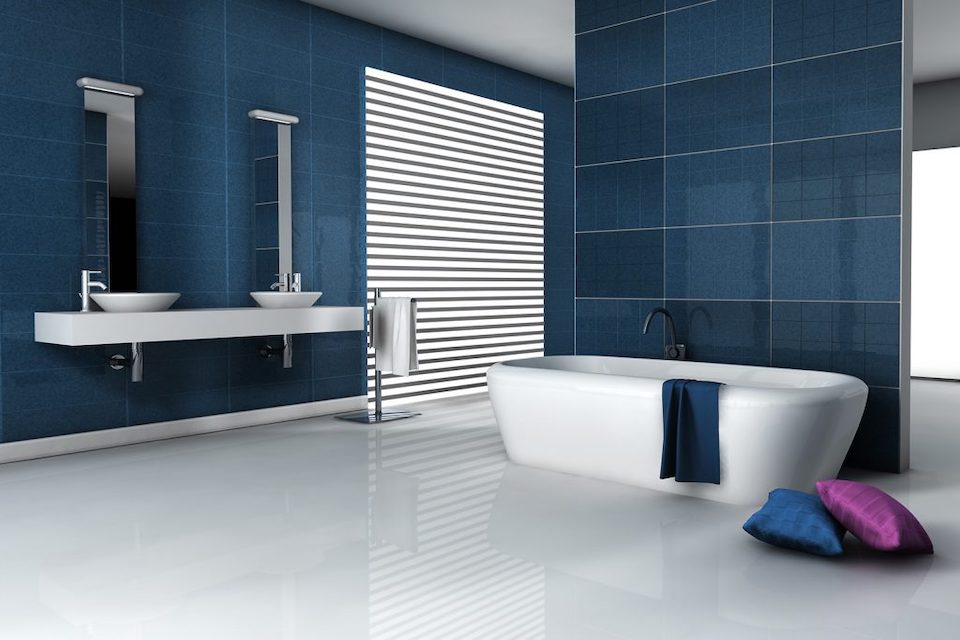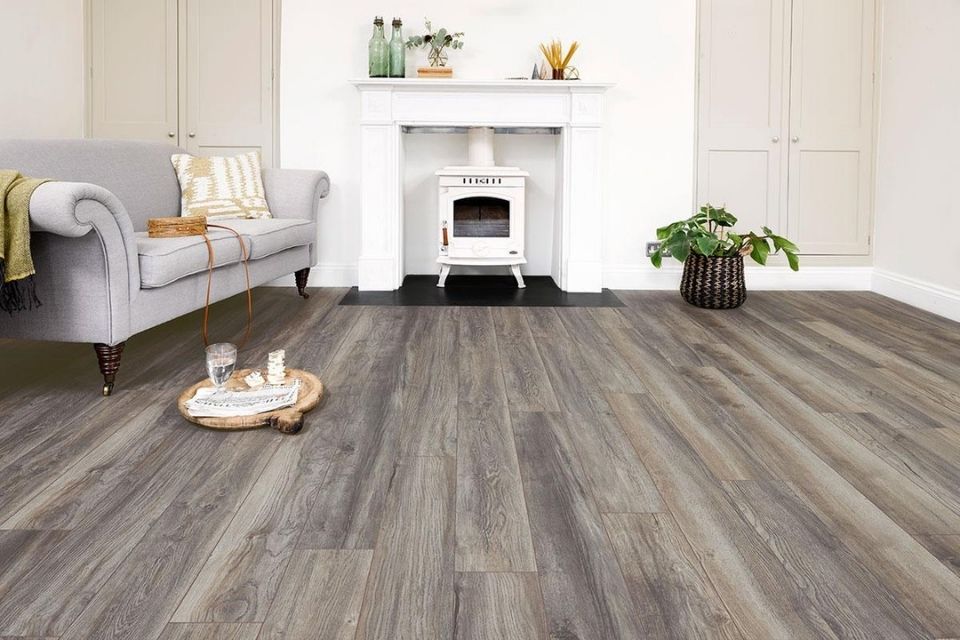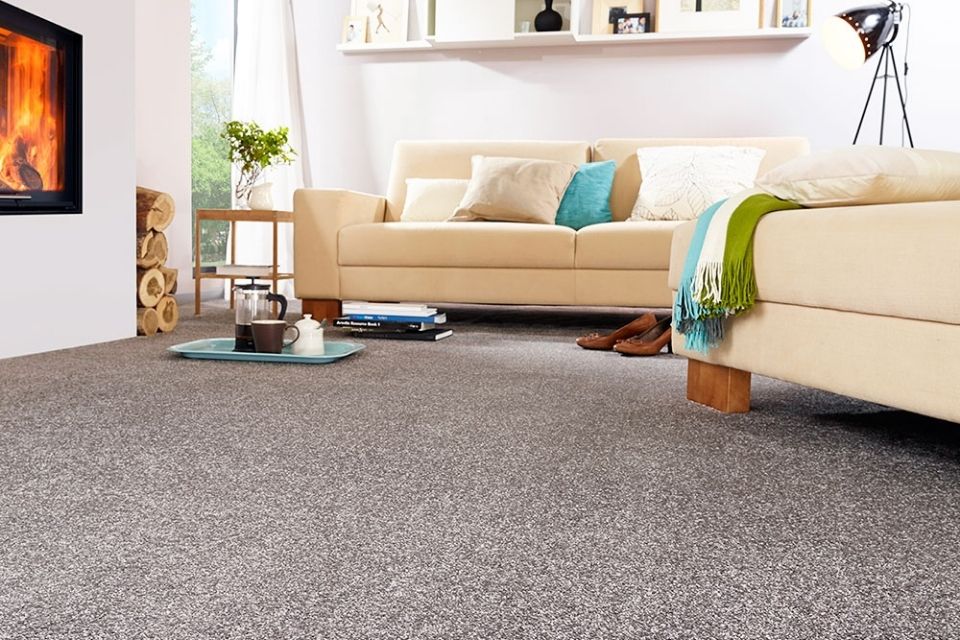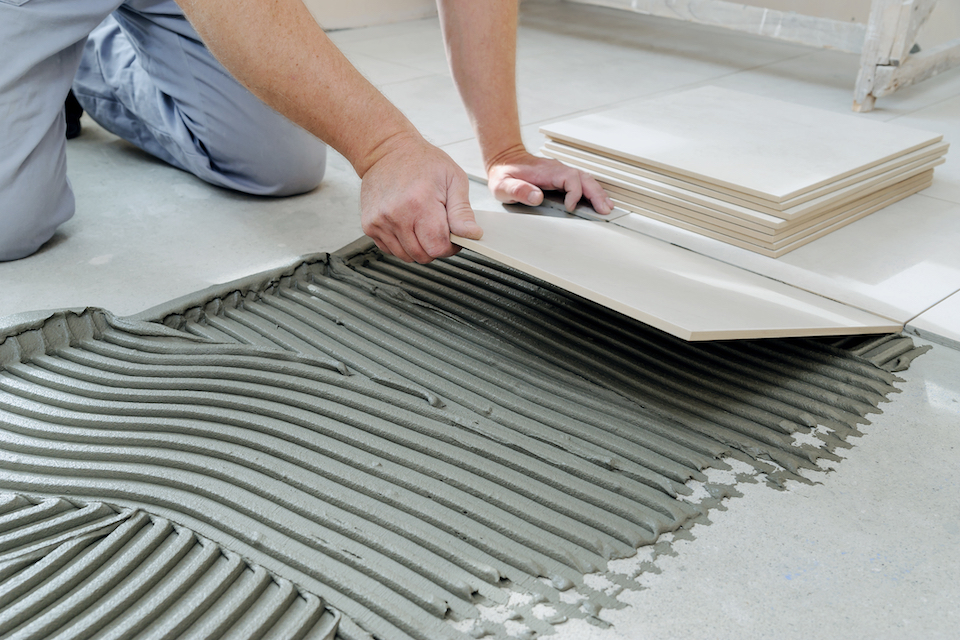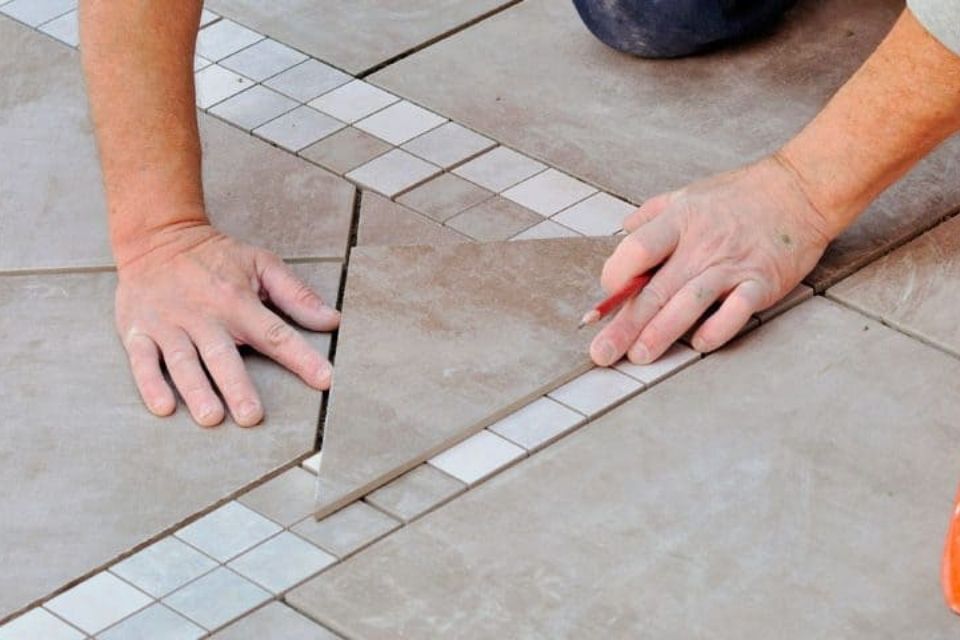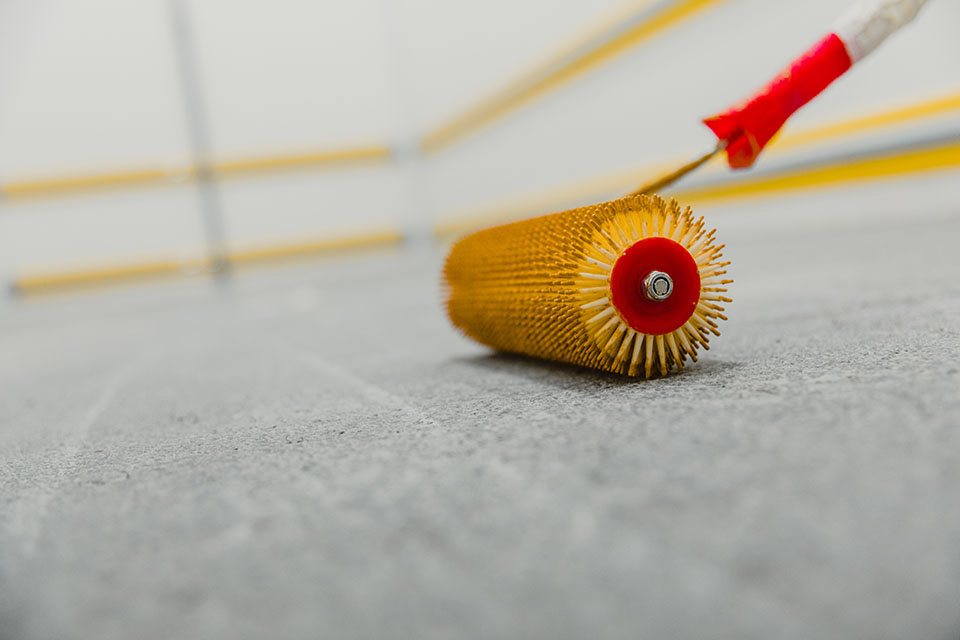How Much to Tile a Bathroom?
The cost of tiling a bathroom differs significantly. The most important considerations are the space you want to be tiled, the sort of tiles you choose, and who you employ to execute the work.
Let's take a look at the average price ranges then...
The cost of tiling a bathroom ranges from £920 to £4800. This includes the cost of both the goods (tiles, grout, and adhesive) and the labour.
You'll have many choices to make because there are so many aspects that influence the pricing. When making your decision, keep in mind that labour accounts for most of the cost, as tiling may be a difficult process to accomplish perfectly.
The cost of floor tiling for a medium-sized bathroom should be between £214 and £1,000. Installing tiles in your shower, on the other hand, is a great way to modernise the room.
Getting the best results...
You will need to invest some money to work efficiently and get huge benefits. The average material cost for tiling showers starts at £8 per square metre, with a typical shower costing roughly £300 in labour and materials.
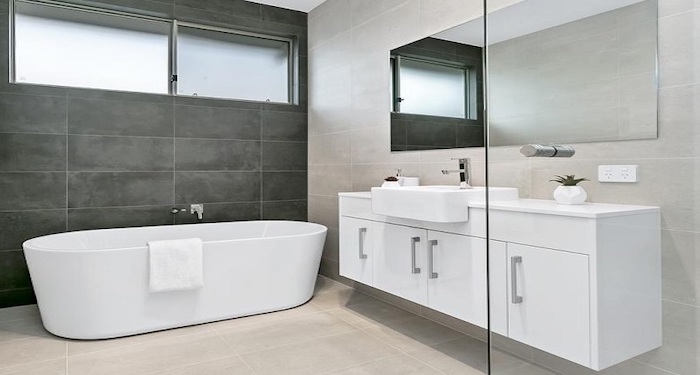
It's crucial to determine a budget before you start looking for your dream tiles. You can do this by determining whether you will do the work yourself or hire a professional to do it for you, using the information in this article.
Once you have a rough estimate of how much it will cost, you may create a budget to ensure you don't overspend. Choose whether you want to tile the entire bathroom, just the walls, or just a few spots.
Depending on the style you choose, tiles might cost anywhere from £8 to £50 or more per square metre.
The total cost of tiling your bathroom is determined by a few factors. The first consideration is the tiled area. The most expensive choice is to tile the entire space from top to bottom, including the floors and walls. The most cost-effective alternative is to just tile above the sink.
So what else needs to be considered here?
The type of material used to make the tiles is the next factor to consider.
There is a significant price difference between vinyl tiles and genuine stone tiles. The room's size and design will significantly impact the cost of both materials and labour. The more tiles that must be cut, the more difficult and costly the process becomes.
Bathroom Tiling Prices in 2025
Here are examples of costs for tiling a medium-sized bathroom:
| Type of Job | Ceramic Tiles | Granite Tiles |
|---|---|---|
| Wall and floor tiling | £920-£4,800 | £2,800-£4,800 |
| Wall tiling | £706-£3,800 | £2,210-£3,800 |
| Floor tiling | £214-£1,000 | £590-£1,000 |
| Bath tiling | £257-£700 | £445-£700 |
| Sink splashback tiling | £83-£200 | £295-£300 |
When it comes to labour, the cost of a tiler will vary depending on their experience, the size of the company, and your location, with London pricing being higher. Rates per square metre can range from £20 to £40 per square metre in the end.
On the other hand, tilers can charge by the day if they'll be there for more than six hours or so, which might range from £150 to £200 each day.
There are also extra expenses for items like grout and adhesives, which can cost up to £50 depending on the size of the project. There are also extra fees if the walls need to be prepared, such as plastering or removing old tiles.
- How Much to Tile a Bathroom?
- Supply Cost to Tile a Bathroom
- DIY vs. Professional Bathroom Tiling
- Additional Costs of Tiling a Bathroom
- Labour Cost to Tile a Bathroom
- How Long Does It Take to Tile a Bathroom?
- Tile Size and Pattern Considerations
- Choosing Bathroom Tiles
- Benefits of Bathroom Tiling
- How Much Does It Cost to Remove Bathroom Tiles?
- FAQs
Supply Cost to Tile a Bathroom
When calculating supply prices for tiles, grout, and adhesive items, you will need to consider the size of the job and whether the walls need to be prepped by plastering or removing old tiles, grout and adhesive. However, on average, these items normally cost around £50.
A bag of glue for 5m2 will set you back roughly £20, while a pre-mixed adhesive would set you back around £25, saving you time. A bag of grout for a 15m2 area might cost upwards of £15 per bag. When estimating the cost of the job, consider the wide variety of tiles available.
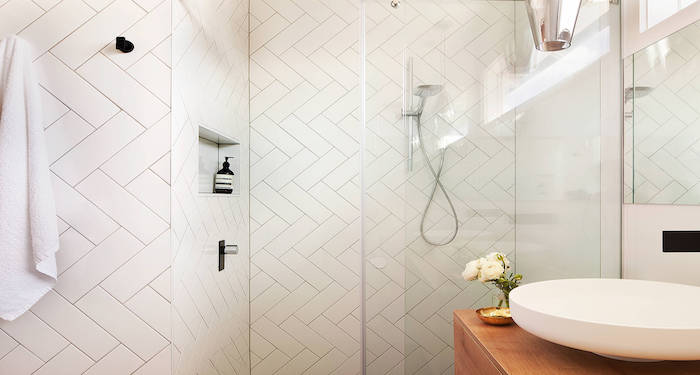
The following is a list of several tile materials and the cost per square metre:
| Material | Cost Per Square Metre |
|---|---|
| Ceramic | £8-£100 |
| Marble | £25-£136 |
| Slate | £55-£65 |
| Limestone | £50-£150 |
| Porcelain | £20-£100 |
| Granite | £55-£100 |
| Glass | £65-£200 |
Knowing the supply cost of tiling a bathroom also depends on how many tiles you need. Depending on the type, tiles alone might cost anywhere from £5 to £50 or more per square metre.
Calculate how many tiles you'll need by multiplying the height and width of the area to be tiled by ten per cent to account for errors and waste. This will give you an idea of how much you'll spend on materials on average.
DIY vs. Professional Bathroom Tiling
When it comes to tiling your bathroom, you have two main options: doing it yourself or hiring a professional tiler. Each option has its advantages and drawbacks, depending on your budget, skill level, and desired outcome. The below table compares the two.
| Factor | DIY | Professional Tiler |
|---|---|---|
| Cost | Lower upfront costs (tools and materials only) | Higher due to labour charges |
| Skill Level Required | High – requires accurate measuring, cutting, and grouting | Low – professionals bring expertise and experience |
| Time Investment | Can be time-consuming, especially for beginners | Faster completion, often within a set schedule |
| Finish Quality | May lack a polished, professional look | A high-quality, even finish with proper alignment |
| Risk of Mistakes | High – errors can lead to wasted materials and added costs | Low – professionals reduce likelihood of costly errors |
| Warranty/Guarantee | None | Often includes workmanship guarantees |
Benefits of Hiring a Professional Tiler
While DIY tiling may save money upfront, the risks and time involved often make hiring a professional a better long-term investment. Especially for larger or more complex projects.
- Expertise: Professionals have the tools and skills to handle complex patterns and tricky spaces with ease.
- Time Efficiency: A job that might take a DIYer several weekends can be completed in just a few days by a pro.
- Reduced Waste: Proper measuring and cutting reduce material waste and unexpected costs.
- Better Finish: Clean grout lines, precise alignment, and waterproofing are typically more reliable.
- Peace of Mind: Most professionals offer guarantees or are insured, offering protection if issues arise later on.
Additional Costs of Tiling a Bathroom
Bathroom tiling is very inexpensive compared to other remodelling projects; nevertheless, it is usually done as part of a larger project, such as a complete bathroom renovation that includes a new bath, shower, toilet, and basin.
Whether you're merely changing the tiles, see if any other jobs (that require the tiles to be disturbed) need to be done as well.
Below is a table of the different additional jobs that could add to the cost of tiling your bathroom.
| Additional Job | Cost |
|---|---|
| Bathroom radiator replacement | £50-£320 |
| Underfloor heating | £50-£150 per square metre |
| New bathroom suite | £1,500-£15,000 |
| New bath | £240-£4,650 |
Replacing Existing Bathroom Radiator
You may wish to install a new radiator. The cost of installing a heated towel rail or radiator in your bathroom will vary greatly depending on the type of heated towel rail or radiator you choose.
Electric and dual fuel heated towel rails and radiators, for example, are more expensive to install than piped solutions because the former must be hard-wired into the mains, which can be challenging!
In most cases it may be a short and simple job if your new bathroom radiator is a direct replacement and the same size as your old radiator.
Installing Underfloor Heating
The system's size and complexity determines the cost of installing underfloor heating. All systems necessitate the removal of the floor, the installation of the system, the connection to a power supply, and the installation of sensors and controls.
Prices vary as to whether it is a dry (electric) system around £50 to £60 per m2 to £40 to £150 per m2 for a wet system. The average day rate for expert installation is £300. You'll probably get quotations for approximately £100 per square metre. The cost of installing under-floor heating may increase based on the distance from the boiler system and the additional pipe required.
Installing a New Bathroom
The typical cost of a new bathroom is between £3000 and £6000, while a high-quality bathroom installation can cost up to £15,000.
Installing a basic quality bathroom could cost anything from £1500 to £2000. A bathroom of intermediate quality will cost between £3000 and £6000, while a bathroom of exceptional quality would cost between £7000 and £15,000.
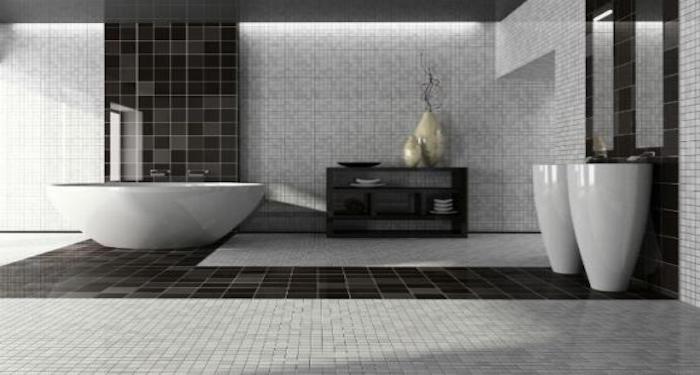
You may anticipate paying between £1000 to £3000 for a small bathroom installation. A medium-sized bathroom will generally cost between £3000 and £6000, while a larger bathroom may cost up to £10,000. It could cost considerably more depending on the size of your bathroom.
Installing a New Bath
Bath installation costs range from £240 to £4650 on average. The total cost of installing a bath is determined by the style of bath you select, the size of the bathtub, convenience of access, and the number of tradespeople necessary.
The location of your house is also important, as contractors charge more in rural places, and you may pay more if you reside in a major city like London. Depending on the type of bath you want has a huge impact on your budget.
Labour Cost to Tile a Bathroom
The rate a contractor will charge you is determined by a mix of the workman's experience and your location. A seasoned tiler in London will be more expensive than a rookie in Yorkshire. Assuming the walls and floors have been prepared, it will cost between £20 and £40 per square metre.
You should anticipate paying between £150 and £200 per day for major works that would take longer. Some tiles are more difficult to fit because they are more difficult to cut.
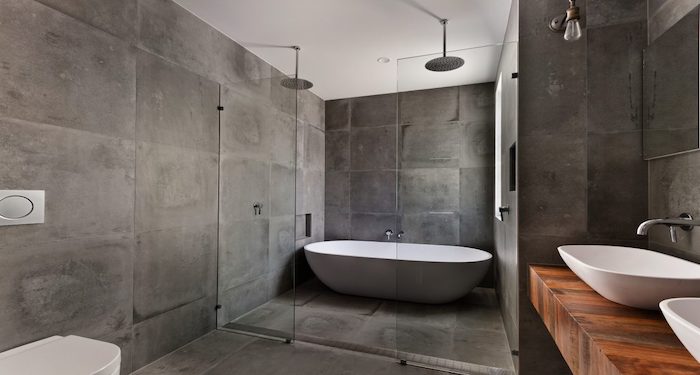
You should expect to pay a little more for labour if you use travertine tiles. The same can be said for huge regions of little tiles or tiles set uniquely.
The amount of time it takes to tile a bathroom depends on several things. Jobs that necessitate the cutting of additional tiles will take longer and smaller tiles take longer to install than larger ones.
The table below will give you a good estimate of the average cost of tiling a medium-sized bathroom:
| Job | Price |
|---|---|
| Wall and floor tiling | £600-£800 |
| Wall tiling | £450-£600 |
| Floor tiling | £150-£200 |
| Bath tiling | £225-£300 |
| Sink splashback tiling | £75-£100 |
How Long Does It Take to Tile a Bathroom?
The amount of time it takes to tile a bathroom depends on several things. The type of employment you have will have a significant impact. Jobs that necessitate the cutting of additional tiles will take longer.
It takes a lot longer to install smaller tiles than it does to put larger ones. A larger tile will take up more area, requiring fewer tiles to be set throughout the project.
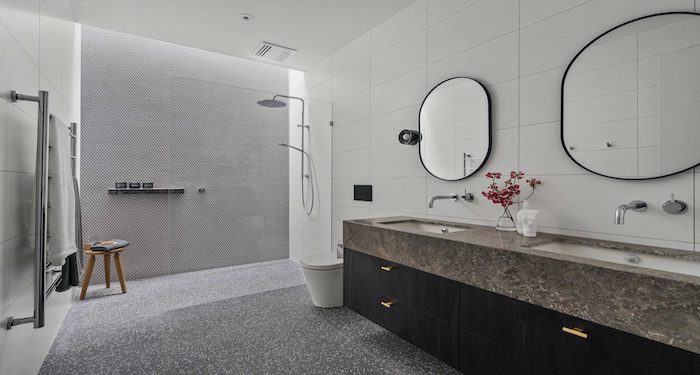
It's impossible to predict the length of time it will take to install tile flooring. However, most craftsmen estimate that tiling a 40-square-foot space will take roughly four hours. In addition, each task requires an hour of prep time, an hour of designing time, and an hour of grouting and cleaning time per square foot.
There should be at least 24 hours between the installation and grouting to ensure it has fully set.
Using this as a rough guideline, you should be able to estimate how long it will take to tile your bathroom entirely.
The table below illustrates the various timeframes required for various types of jobs in a medium-sized bathroom.
| Job | Timescale |
|---|---|
| Wall and floor tiling | 4 Days |
| Wall tiling | 3 Days |
| Floor tiling | 1 Day |
| Bath tiling | 1.5 Days |
| Sink splashback tiling | Half a Day |
Tile Size and Pattern Considerations
When you are planning a bathroom tiling project, the size of the tiles and the complexity of the pattern can significantly affect both the cost and the installation time. Let's look at the reasons why.
Impact of Tile Size
Larger tiles generally cover more area, which can reduce the overall time needed for installation. However, larger tiles may also require more precise cutting and placement. this is especially true in smaller or irregular shaped bathrooms. Small tiles, such as mosaics, often take longer to install due to the increased number of grout lines and detailed placement required.
Pattern Complexity
Simple, straight-lay patterns are quicker and more cost-effective to install. If you want a more intricate pattern, like herringbone, chevron, or basket weave, they require more cutting, measuring, and attention to detail. This will increase labour costs and the time needed to complete the job.
Cost Considerations
- Straight Installation: Least expensive due to the ease of installation.
- Diagonal or offset Installation: Moderate cost due to extra measuring and cuts required.
- Herringbone or chevron Installation: Highest cost due to the complexity and precision needed.
Choosing the right tile size and pattern requires a balance between looks, budget, and installation time. If you're unsure, speak with a professional tiler. They can help you pick the most suitable option for your space and budget.
Choosing Bathroom Tiles
Bathroom tiles should be able to withstand a lot of water and steam while also being readily and thoroughly cleaned. Tiles are a very frequent bathroom floor and wall covering.
Tile repels water and is simple to clean using disinfectants that kill germs, bacteria, mould, and other nasties.
There are numerous tile options available, including:
Ceramic Tiles Cost
Ceramic tile comes in a broad variety of colours, sizes, forms, and finishes, as well as textures.
You can choose between a rock and wood texture, which is ideal for a warm bathroom. Others may want pure wood texture tiles for their bathroom to achieve a natural theme, which will appear as if the floor tiles are the same as the wall tiles.
These tiles are resistant to breakage, easy to maintain, and cost-effective. This type of tile normally costs around £8-£100 per m2.
Often used for bathroom walls and floors, show enclosures and vanity backsplashes.
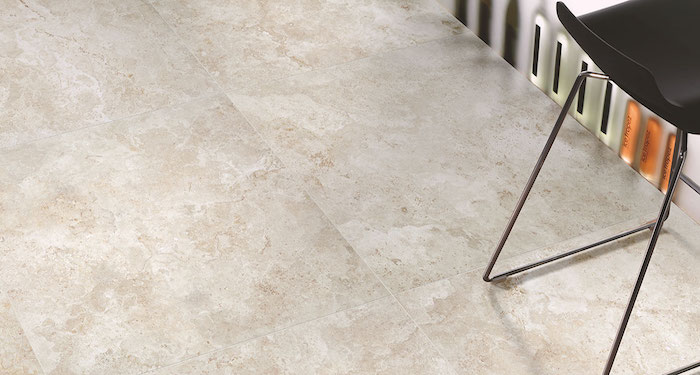
PROS
- It doesn't absorb water when glazed
- Durable and long lasting
- Inexpensive fitting a wide range of budgets
- Easy to clean and maintain
CONS
- Less water-resistant than porcelain when unglazed
- Can feel cold and hard underfoot without underfloor heating
- Grout lines may stain if not sealed properly
Terracotta Tiles Cost
Terracotta tiles are a sort of tile that has been around for a long time. Terracotta tiles provide a warm, inviting atmosphere in your home. It's a tile flooring material with a robust surface made of a subtle red or earthy hued clay.
In terms of upkeep, you'll need to seal it with a sealing agent every two years to keep the tiles free of stains and damage. Terracotta tiles normally cost between £25-£50 per m2.
Often used for bathroom floors, feature walls and wet rooms with a rustic design theme.
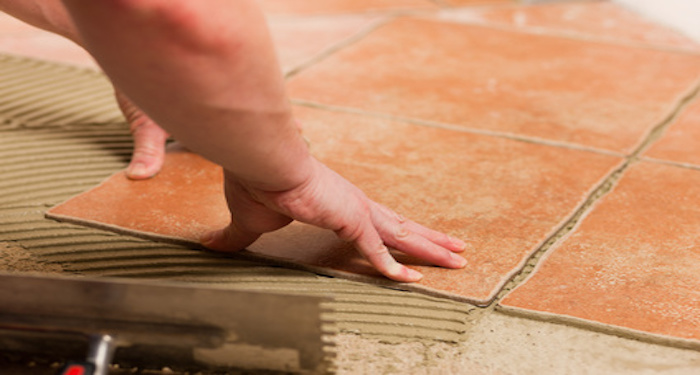
PROS
- Provides a warm, natural, and inviting look
- Affordable and widely available
- Eco-friendly as made from natural clay
- Non-slip surface when unglazed, making it suitable for bathrooms
CONS
- Requires regular sealing to protect against moisture and stains
- Porous surface so can be vulnerable without proper maintenance
- Softer than porcelain or ceramic so may chip under heavy impact
Vinyl Tiles Cost
In bathrooms, vinyl tiles are the most popular. It's simpler to set up and reusable, making it more environmentally friendly. It is less likely to crack or break.
Most people use it because it is less expensive than ceramic tiles. These luxury vinyl tiles cost on average £25-£45 per square metre in materials.
Often used for bathroom floors, toilet and utility flooring.
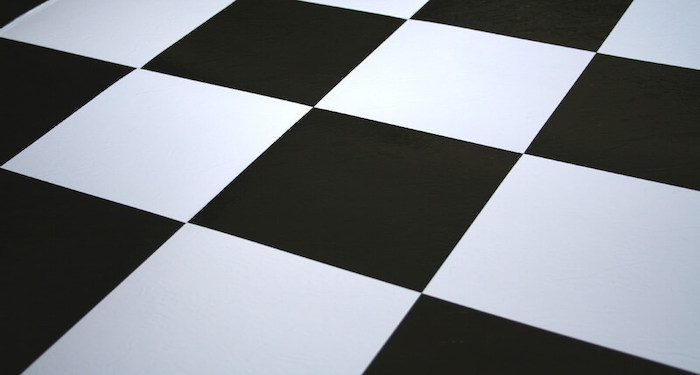
PROS
- Inexpensive and widely available
- Highly resilient and water-resistant
- Easier and quicker to install than other options
- Soft and warm underfoot compared to harder tiles
CONS
- Less visually appealing than ceramic, porcelain, or stone
- Can dent or scratch under heavy furniture or sharp objects
- May fade over time
Marble Tiles Cost
Marble tile can be highly polished and comes in various sizes, making it both refined and classic. Marble can be veined or patterned to give character to a bathroom. Marble tiles normally cost around £25-£136 per m2.
These are often used for bathroom walls, shower walls, vanity backsplashes and feature walls.
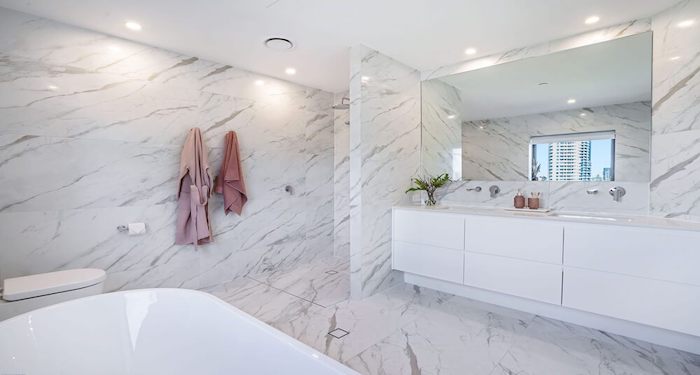
PROS
- A beautiful, high-end addition to your home
- Unique veining ensures no two tiles are alike
- Highly polished finish that reflects light and adds brightness
CONS
- Expensive both in material and installation
- Easily scratched
- Requires regular sealing to maintain appearance
- Slippery when wet, especially if polished
Granite Tiles Cost
Granite is a premium choice for bathroom, perfect for decorating spaces with a rustic atmosphere. It comes in a variety of colours and styles and is attractive, sturdy, and versatile.
It's ideal for baths because it's stain and moisture resistant. These tiles normally cost around £55-£100 per m2.
Ideal for bathroom floors and walls, vanity countertops and splashbacks, shower enclosures and luxury en-suite bathrooms.
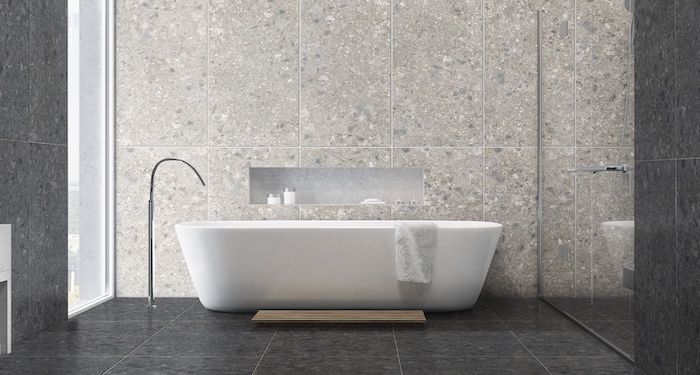
PROS
- Extremely durable and hard-wearing
- Naturally resistant to moisture and stains
- Unique, high-end appearance with natural veining
- Heat-resistant so ideal for underfloor heating
CONS
- Slippery when polished
- Higher cost compared to other options
- Heavy so may require reinforced subfloor and professional installation
Limestone Tiles Cost
Limestones have a firm and solid surface that makes them perfect for flooring.
Limestone tiles have muted colours that give them a clean and cosy feel, which is ideal for a bathroom. This tile typically costs around £50-£150 per m2.
They are a good choice not only for bathroom floors and walls but also for walk-in showers and wet rooms as well as vanity surrounds and decorative accents.
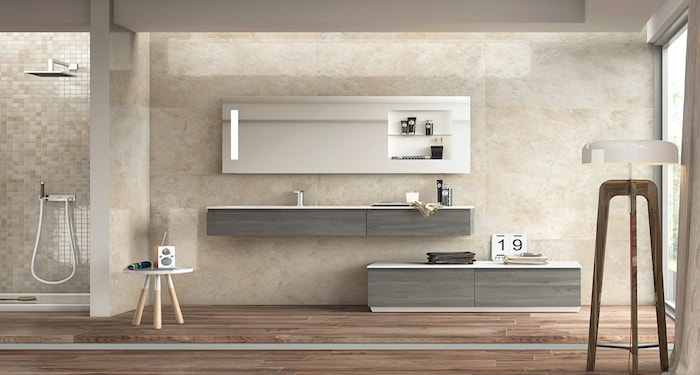
PROS
- Natural and elegant appearance
- Soft and easy to shape, so great for custom layouts
- Durable when properly sealed and maintained
- Non-slip finish options available for bathroom safety
CONS
- Soft and porous rock. Make sure the seal is tight
- Cleaning chemicals with a neutral pH are required
Glass Tiles Cost
Glass tiles are becoming increasingly popular due to the growing number of possibilities available that may be modified to meet your specific requirements.
The many types, hues, and tints of the wall-mounted glasses will reflect attractively on the lighting in your bathroom.
As a result, depending on the styles and themes you wish to use, it offers a choice of patterns to pick from.
Multi-coloured glasses are now available for use in mosaic arts, making them ideal for adding colour to bathrooms. When correctly installed, this sort of tile holds up well and, if textured, can help to prevent slips.
Glass tiles are stain and mould resistant. They are prone to displaying dirt easily, so you will always be aware when it is time to clean them. Cleaning is simple, requiring only warm water and a mop.
This type of tile requires special attention during installation and is prone to scratching. Yes, the tile is extremely resilient, however, dropping something heavy from a tremendous height will cause it to crack or chip.
Glass tiles usually cost between £65 and £200 per square metre.
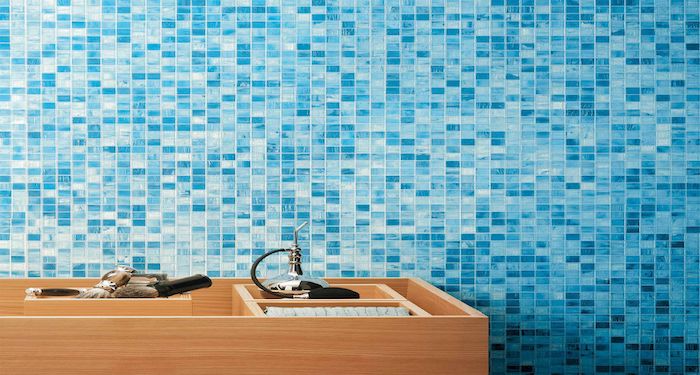
PROS
- Shiny surface
- Hard
- Durable
CONS
- Scratches
- Expensive
Benefits of Bathroom Tiling
Several common jobs come to mind when it comes to remodelling your bathroom. However, laying down some high-quality tiles is the most effective and least expensive option.
These home upgrades not only save you money by eliminating the need to employ a costly contractor, but they also add significant value to your property. Here are some of the advantages that you may soon enjoy if you decide to tile your bathroom.
Tiles Are Cheap to Maintain
Whether you're installing floor or wall tiles in your bathroom, there's one major advantage over other options: maintenance! This is especially true if you choose a ceramic floor or wall tiles, as they are usually water-resistant and require little maintenance if properly installed.
Any dirt or filth can be sponged off, and aside from applying sealant now and then, you're good to go after these are fitted.
Cost-Effective
In today's home improvement floor and wall arena, tiles are still one of the top choices. When you consider the cost per square metre, as well as the ease of upkeep and exceptional durability of tiles for your bathroom, it's easy to see why they're still one of the most popular choices in the UK and abroad.
You may find some excellent offers if you browse around, so a little time spent on the internet can pay off handsomely.
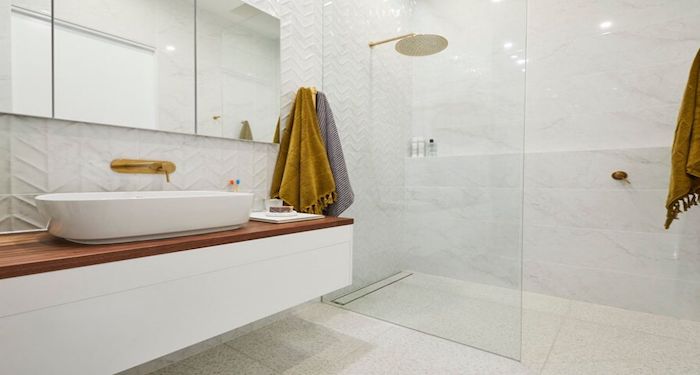
Durable
If you go back to the Roman era, you'll notice that palaces were adorned with a lot of tiles, and with good reason.
Quality tiles will last for years, and your bathroom will continue to add value to your property if you install them correctly and apply the proper grout and sealer.
Offer Huge Style Options
You might prefer simple tiles, or you might be obsessed with the latest funky patterns. It makes no difference because you'll be able to get a perfect match (or anything near) at your local home improvement store.
Feature tiles may offer many colours to your bathroom, so don't rush to find the perfect mix because they'll become a permanent part of your home.
How Much Does It Cost to Remove Bathroom Tiles?
Changing your flooring is one of the most effective methods to give a room a new look and feel. But what if your floor is made of tiles? Fortunately, getting rid of it is much easier and less expensive than you might imagine.
Here's how much it costs to remove a ceramic tile floor.
Getting a professional to remove your ceramic tile flooring will cost roughly £13 per m2 as a rule of thumb. In the United Kingdom, the average room is 16.3 m2.
That means your total ceramic tile removal cost for a standard room will be roughly £212.
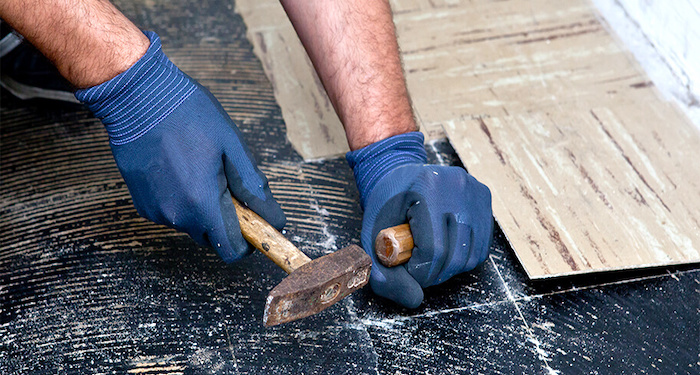
The cost of removing a ceramic tile floor is determined by various factors, including the size of your room and labour costs in your location.
However, the primary price difference is usually determined by what you plan to do with your floor next.
The state of the sub-floor beneath the tiles will be revealed when the tiles are removed, and it may not be suitable for laying down new flooring right away.
| Job Description | Cost Per Square Metre |
|---|---|
| Floor tile removal | £13 |
| Wall tile removal | £13 |
| Re-tiling preparation | £6 |
| Waste removal | £1 - £5 |
FAQs
Q: How do you clean bathroom tiles?
A: There are three options on how to clean your bathroom tiles, lemon, vinegar and baking powder.
Lemon's natural acidic characteristics make it a great tile cleaning agent. Spritz lemon juice onto tiles with a spray bottle before wiping clean with a moist cloth or sponge.
Alternatively, you can soak a towel in lemon juice and wipe the tiles with it before rinsing with warm water.
Another option is to fill a spray bottle halfway with 1/2 cup distilled white vinegar and one-litre warm water. Spritz on tiles and wipe with a moist cloth to remove.
Alternatively, immerse a soft fabric, such as a microfibre cloth, in the solution and wipe the tiles before rinsing with warm water. White vinegar is an excellent natural disinfectant and tile cleaner; however, it should not be used on natural stone tiles such as marble, granite, or travertine.
If you have baking soda or bicarbonate of soda, prepare a paste with 2-3 cups baking soda and a little water, or sprinkle directly on the tiles to bring them up.
To remove difficult stains, scrub them in with an old toothbrush or a sponge. After that, wash off the tiles with a lemon-soaked cloth before rinsing with warm water.
Cleaning with baking soda or bicarbonate of soda is an efficient tile cleaner, particularly for stubborn stains and grouting.
Q: Can you paint bathroom tiles?
A: Yes, bathroom wall tiles may be painted! Most paints are only suitable for ceramic tiles; however, natural stone should not be painted because it will sink through the tile's surface.
Painting your bathroom tiles used to be synonymous with a shoddy job, but that is no longer the case.
Painting tile in low-moisture areas of your bathroom, such as the backsplash over the sink and the tile behind the toilet, will yield the best results. Preparation is the key to painting ceramic tiles successfully.
Q: Why do bathroom tiles crack?
A: Floor tiles fracture for various reasons, the most important of which is that the surface beneath them is not stable enough. Depending on the material used, different subfloors can contract, expand, or bend. If the tile you bought or had installed was of low quality, you may see cracks.
Q: Can you DIY bathroom tiling?
A: Shower tiling is a simple DIY job that can be completed in a few days if you have the right materials and equipment. Then, using this tutorial for step-by-step directions on how to tile a shower, choose your shower tile.
To avoid injury, wear safety goggles and ear protection when installing tile. It may take a bit longer than hiring a professional, but DIY is a viable option.
Q: How long do bathroom tiles last?
A: Tiles are a tough material that lasts a long time. A stone tile will last well over 100 years, according to the NAHB (National Association of Home Builders), whereas ceramic tiles would last no less than 75 years.

